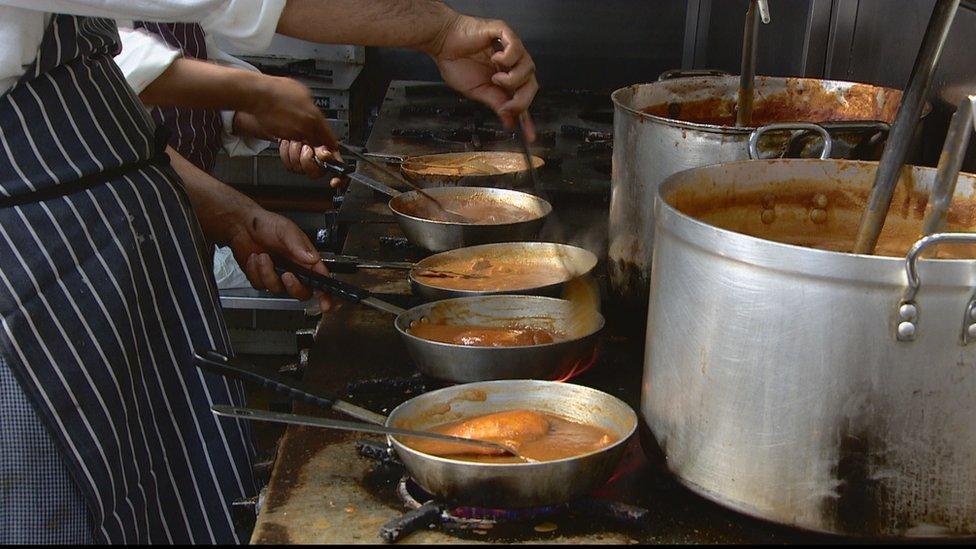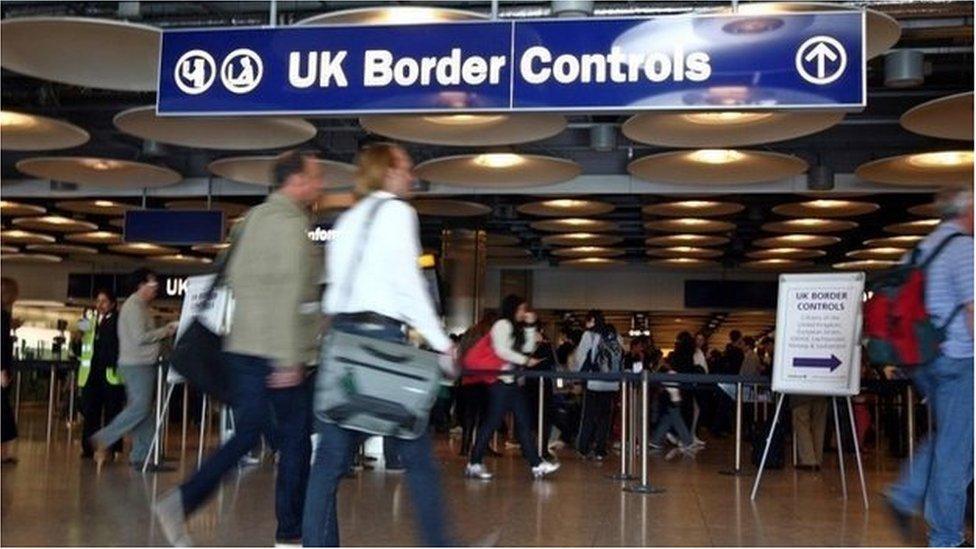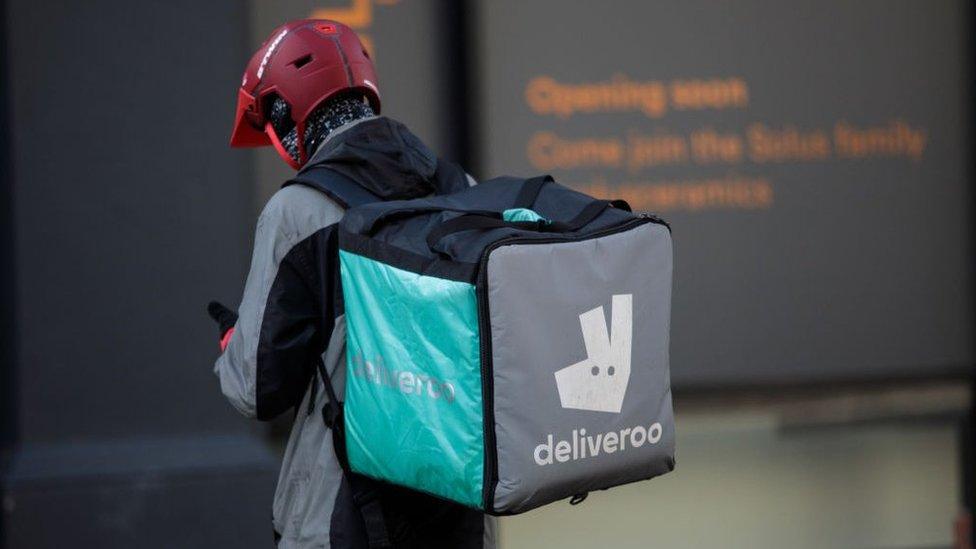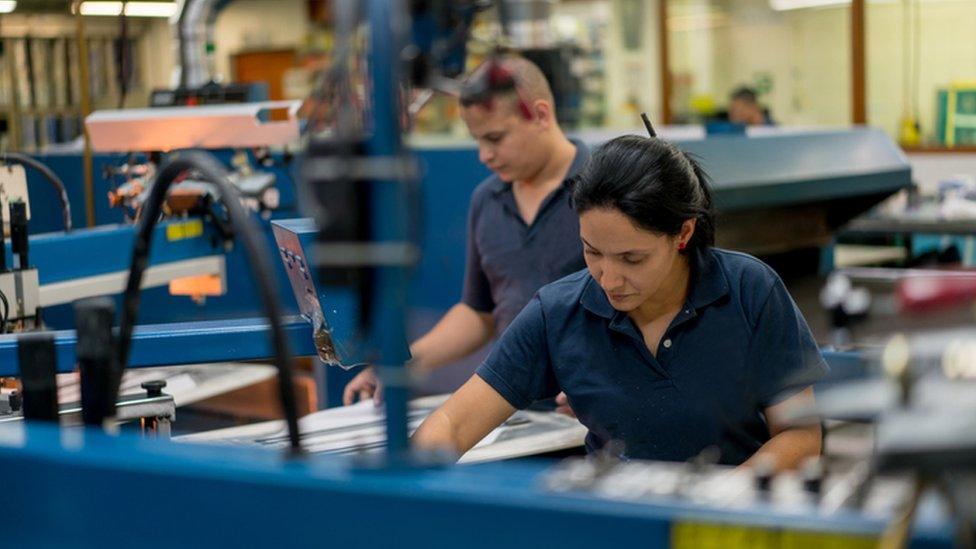Auld Scotia calling Nova Scotia
- Published

With unemployment low, skill shortages are increasing, and more occupations have been found to require recruits from beyond the UK and the European Union.
The official adviser on work visas is telling Whitehall it should open up fast-track, lower-cost visas to a much wider range of jobs.
Scotland is the only part of the UK to have its own list of special occupations, now including nuclear chemists and Gaelic-medium teachers.
The challenge of recruiting and retaining in remote areas is particularly difficult, and may need a new approach.
There's a recommendation to relax rules intended to ensure that only high-end chefs make it into Britain's kitchens.
A tight labour market is sure to get tighter after Brexit. With unemployment at historic lows, the strain is already showing.
The Migration Advisory Committee has the task, on behalf of Whitehall government, of casting a detailed and drily economic eye across recruiters' claims of shortfalls.
It advises Whitehall on special measures which require lower barriers and cheaper fees for those migrants and recruits that are most needed.
The lower barriers include the avoidance of delays while recruiters have to advertise vacancies to demonstrate that UK and EU citizens are not available to fill them.
Its latest findings suggest that the occupations with a need to cast the recruitment net beyond the European labour pool has grown from 1% of the labour market to 9%. That's a rise from 180,000 to 2.5m.
To be clear, that's not the number of migrants needed to fill the gaps.

But the big vacancies tell a story of incentives skewed into the funding for the wrong training and/or poor retention.
The dry economics gives shortish shrift to the notion that more care workers should be recruited from far afield. The answer can be to make the job more attractive to people already in Britain.
In assessing the question of retention, the report reviews some astonishing evidence about the extent of attrition in Scotland's teaching profession, including recent recruits.
It's well known that the National Health Service has big problems with vacancies, often for jobs that can take a decade of education and experience. Having trained professionals, many of them leave the UK, often for an easier working life. So the NHS has to turn, first, to EU recruits and then beyond Europe.
Abattoirs
Scotland is the only part of the UK to have its own list of skill scarcity. The Advisory Committee is recommending that should, in future, also apply to Wales and Northern Ireland.
That is significant. It is an acknowledgement that a "regional" approach to immigration will have to be considered as policy goes through radical changes post-Brexit.
The evidence presented in this week's report shows clearly that Scotland benefits far less than its population share would suggest it might from fast-tracked, lower-priced visas to fill its vacancies.

The MAC says Scotland has 8.2% of the UK's employment, yet benefits from only 2.4% of the visas issued under the Shortage Occupation List (SOL). London and south-east England have 28% of the workforce, and get 42% of the SOL visas.
While including all the categories across the UK as a whole, Scotland's additional list has recently featured specialisms in medicine, including psychiatry, anaesthetics, paediatrics and gynaecology.
The latest list includes all medical professions within the scarcity list for the whole UK. It adds all forms of nurse, psychologist, occupational therapists, speech therapists and paramedics, not forgetting vets.
It is pointed out that more than 95% of vets working in abattoirs, where vets' certification is required, are from outside the UK. For highly-qualified British vets, working in a slaughterhouse is, understandably, not perceived as living the dream.
To that, add most types of engineer, geophysicist and biologist. The list now includes archaeologists, architects, secondary teachers of maths and physics, film animators and welders.
There continues to be a need to fast-track work permits for the most en pointe of ballet dancers and orchestral musicians from outside the EU.
Going nuclear
The Scottish government appears to have thrown a lot of effort into making the case for special measures to fill gaps in education, tourism, culture, creative, manufacturing, construction, financial services, digital, the voluntary sector, farming, seafood, the environment, logistics and transport.
It was backed up by lobbying from industry groupings within Scotland, though "for the most part, the sectors and occupations mentioned in the evidence were very similar to those mentioned in other parts of the UK".
Where Scotland got additional job listings were in two specialised areas of nuclear chemistry, where recruits are needed to help decommissioning power plants at Dounreay and Chapelcross, and in Gaelic school teaching.
Bord na Gaidhlig, the language promotion body, explained that the demand for Gaelic-medium education is not being met by the supply of teachers. Merely five recruits were sought for Gaelic-speaking teacher training courses in 2017-18, yet there was no intake that year.
The Migration Advisory Committee was told that "the pool of potential Gaelic teachers is small. However this could be boosted by the population of Gaelic speakers in Nova Scotia, Canada".
Remote control
One of the issues around Gaelic medium education is that many of the schools are in smaller communities of the Highlands and Islands. Recruiting into remoter areas is a particular challenge.
The figures show it. International in-migration into Scotland in 2013 to 2017 ran to 6.42 people per thousand. In larger cities, it nearly reached 16. In parts of Scotland which are remote or mainly rural, it ranged between 2.6 and 3.
"This indicates that the current migration system is not very effective in dealing with the particular problems remote communities experience," concludes this week's report. "Trying to address these problems through regional SOLs is unlikely to be successful."
Something "more bespoke" is required. International experience suggests that visas requiring immigrants to work in remote areas do not have much success at keeping them there when the requirement is relaxed and they can work elsewhere.
A pilot programme is being suggested, to see how best to direct incomers to the most hard-to-reach, hard-to-recruit places.
Visa tikka masala
The recruitment of chefs has been a particular concern for Britain's hospitality industry, not least those with specialist skills in various cuisines from around the world.
Nearly 17% of the chef workforce in Britain was born in Europe but outside the UK. A further 30% were born outside the European Economic Area. "Employers reported difficulties in filling vacancies at all levels."
An influx of South Asian chefs earlier this decade, each on limited-term visas, meant that their time has been running out recently. And with Theresa May's immigration targets far from being reached, it has been hard to get new work visas.
The rules have been written to ensure that the chefs being recruited from beyond Europe are not just any bog standard caterer, but chefs with at least five years' experience, and working in one of the more reputable eateries. This has been achieved by limiting the special visa treatment to restaurants which do not provide takeaway food.
Only tiny numbers of such visas have been issued. Immigration lawyers say it's not worth the hassle.

But of course, takeaway is provided increasingly by some posh nosh outlets. The rule has had the perverse result that some restaurants have had to choose whether they get the chef they need, with which to expand their business and improve the quality of their service, or not to provide takeaway food, which also stunts business growth. And all that to comply with the Home Office's version of up-market catering.
The Advisory Committee has caught up with the Let's Eat and Deliveroo phenomenon faster than Home Office ministers. It is recommending that the "takeaway clause" should itself be taken away.
UK Hospitality, the sector's representative body, is relieved, but wants to go further - removing the salary threshold for inbound chefs, which currently stands at just under £30,000.
The Migration Advisory Committee says it will look at salary thresholds in its next report.
As it happens, that £30,000 figure is the threshold for work permits on which the UK government is currently consulting, as it looks to the immigration policy for all sorts of foreign recruits that will (or would?) follow Brexit.
Employers who recruit overseas are emphatically opposed to it being that high.
If candidates to become the next Tory leader and prime minister ever get beyond talking about Brexit itself, they may also indicate if there is a softening of the Theresa May approach to immigration and foreign workers.
- Published29 May 2019

- Published14 May 2019

